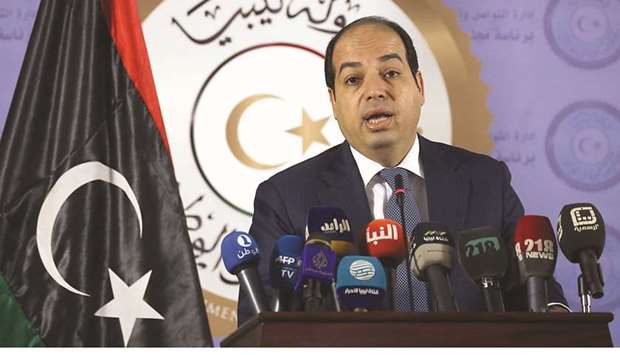At least 27 people have been killed and nearly 100 wounded in several days of fighting between rival militias near the Libyan capital, the health ministry said yesterday.
The clashes broke out on Monday in suburbs south of Tripoli and continued into Wednesday evening after a truce collapsed, despite an appeal by the United Nations for calm.
The clashes came to an end yesterday after a ceasefire agreement announced by officials from western areas, but it was unclear whether the two rival camps would continue to respect it.
The health ministry said at least 27 people were killed and 91 were wounded in the fighting, most of them civilians.
Fayez al-Sarraj, the leader of the internationally recognised Government of National Accord (GNA), has tasked forces from western and central regions of Libya with ensuring the rivals adhere to the ceasefire.
These forces are meant to guarantee the withdrawal of the two rival camps from front lines and ensure normal life returns in the districts affected by the fighting.
The proposed pacifying forces consist mainly of powerful armed groups from the cities of Misrata and Zintan in the west, which are technically under the GNA’s defence ministry.
Under the orders of Sarraj, who heads the Libyan army, these military units will be allowed to operate in the capital and its environs only until September 30, when they must leave.
The Misrata and Zintan militias controlled the Libyan capital from the fall of dictator Muammar Gaddafi in 2011 until 2014, when a coalition of militias mainly from Misrata seized the city.
This week’s fighting has pitted Tripoli militias loyal to the GNA against the so-called 7th Brigade.
This unit is from the town of Tarhuna southeast of the capital and is supposed to operate under the GNA’s defence ministry.
In a televised speech, Sarraj said yesterday that the 7th Brigade had been “dissolved” since April, before calling on the rival camps to respect the ceasefire.
In a joint statement, the embassies of Britain, France, Italy and the United States said yesterday they were “deeply concerned about the recent clashes in and around Tripoli that are destabilising the situation”.
“Pursuing political aims through violence will only further exacerbate the suffering of the population of Libya, and threaten broader stability”, the statement said. “Those who undermine Libya’s peace, security and stability will be held accountable.”

Vice President of the Presidential Council of Libya Ahmed Maiteeq speaks during a press conference in Tripoli after clashes near the Libya capital.
